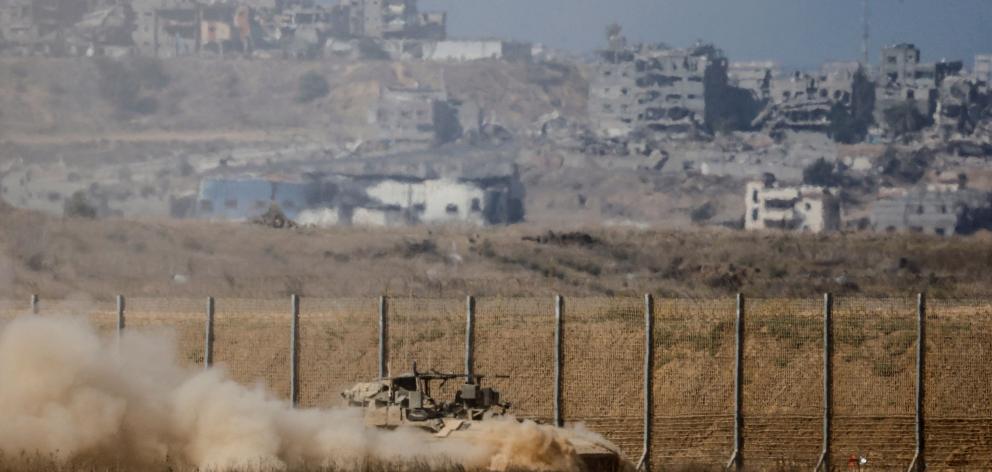
Why is the New Zealand government not challenging Israel over its genocide of the Palestinian people of Gaza?
It is not as though the events in Gaza are hidden from our politicians, with the horrendous images of bodies being buried under rubble in Gaza and a death toll in excess of 43,000 people.
Israel is now targeting medical facilities in Beirut after killing over 3000 Lebanese people in the last month. Israel has now attacked military installations in Iran, further destabilising the Middle East. Israel has now passed legislation banning the United Nations’ (UN) aid agency for Palestinian refugees, UNRWA, from operating in Israel and the Occupied Palestinian Territories (East Jerusalem, West Bank and Gaza).
The decision of the International Court of Justice (ICJ) on January 26, on the "plausible genocide" occurring in Gaza and the obligations arising from its determination, has been ignored. The Convention on the Prevention and Punishment of the Crime of Genocide (1948) requires its members to do everything in their power to prevent a genocide occurring. The failure by Aotearoa to respond to this requirement makes it complicit in a genocide; if not legally, then certainly complicit "in deed".
New Zealand’s unwillingness to put in place sanctions against Israel arising from Israel’s obligations under The Hague Regulations 1907, as the military occupying power, are part of an enduring process over the past 76 years, where Aotearoa has effectively undermined the Palestinian people’s desire for self-determination.
While New Zealand may vote the "right way" in the UNGA setting, we are typically using the forum to present ourselves to other countries as a principled and independent state.
However, New Zealand’s Anglosphere partners understand that such voting behaviour does not represent a policy break with the Alliance. We conveniently trundle out the standard rhetoric of the two-state solution, but this is a smokescreen for doing nothing while appearing to be standing for something.
This begs the question of why Aotearoa fails to act outside the UN setting. Could it be a reflection of its own settler colonial history and its dominant white Anglo identity; a history which doesn’t relate easily to the Muslim/Middle Eastern/Arab "other"?
The National-led government has been rapidly rolling out a range of policy initiatives aimed at embedding a "one New Zealand" identity and erasing a Treaty-based bicultural identity.
These initiatives reassert the dominant settler colonial narrative. Moana Jackson describes this as our "misremembered past".
Prof Naomi Klein refers to memorialisation "from the top", with regard to how Israel has memorialised October 7, 2023. She comments that the trauma arising from the events of that day are infused and conflated with the Holocaust and becomes the justification for the ongoing genocide of the Palestinian people. It is this erasure of indigenous presence that settler states create though asymmetric memorialisation in favour of the dominant settler polity.
For Klein, it is about putting the pieces of the self back together and asking ourselves the question: what would real remembering mean?
In confronting our own settler colonial history, we might more readily identify with the horror inflicted on the indigenous Palestinian people. Our politicians might begin to reframe how we conduct our foreign policy towards the current Israeli genocide and the conflict more generally; an approach which distinguishes itself from our Anglosphere settler colonial allies and makes an independent and active contribution towards resolving the conflict.
Real remembering in Aotearoa would acknowledge our own violent history and its ongoing impact on Māori. This could create the sense of justice and empathy needed to stand firmly behind the Palestinian people and their desire for self-determination and freedom.
The previous minister of foreign affairs, Nanaia Mahuta, drew on the unique Māori-Crown relationship by centring her foreign policy approach in the Aotearoa founding document, the Treaty of Waitangi (te Tiriti o Waitangi). Mahuta chose "the principles of partnership and mutual respect embodied in the Treaty" to provide the foundation for how Aotearoa can conduct its foreign policy.
She chose "values such as manaaki — kindness or the reciprocity of goodwill; whanaunga — our connectedness or shared sense of humanity; mahi tahi and kotahitanga — collective benefits and shared aspiration; and kaitiaki — protectors and stewards of our intergenerational wellbeing".
Following from Mahuta’s lead, which one might refer to as the "Mahuta doctrine" to underscore its uniqueness and distinguish it from what came before, how might the government respond in the case of Gaza?
Significant additional provision of essential medical aid, food and water to Gaza should be offered. Humanitarian visas to reunite Palestinian New Zealanders with family members currently trapped in Gaza, estimated at between 300 and 400 people, must also be offered. Since October 2023, 609 Israeli nationals across both temporary and residence visa applications have been approved to settle in Aotearoa. Only 111 Palestinians have been offered such visas.
On the diplomatic front, Minister of Foreign Affairs Winston Peters must differentiate Aotearoa from its Anglosphere allies, who are locked in blind support for Israel. Targeted sanctions and censure against Israel should now be a prioritised response to the genocide.
A distinction, at the very least, should be made between Aotearoa allowing the entry of Israeli goods produced in the Occupied Palestinian Territory, from the rest of Israel. The Christchurch City Council has just passed such a resolution. We should go further and extend this to all engagement between Aotearoa and Israel until there is a permanent ceasefire.
Aotearoa needs to make a principled stand drawing on its history. It would signal a break in policy within the Anglosphere and not go unnoticed.
It would take courage by Mr Peters, but if he is nothing else, he is definitely up for a fight.
■ John Hobbs is a doctoral student at the National Centre for Peace and Conflict Studies at the University of Otago.










